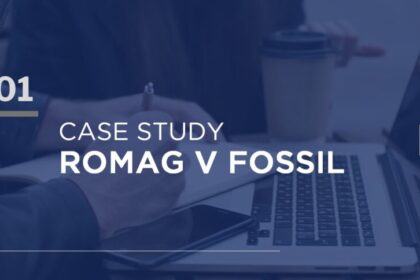
The Companies
Romag sells magnetic snap fasteners for use in leather goods . Part of the American Fossil Group’s business is their line of clothing accessories including handbags. Fossil designs, markets, and distributes a wide range of fashion accessories.
The Case
In 2002 , the two companies, signed an agreement allowing Fossil to use Romag’s fasteners in Fossil’s handbags and other products. Initially, both sides seemed content with the arrangement. In time, Romag discovered that the factories Fossil hired in China, to make its products were using counterfeit Romag fasteners—and that Fossil was doing little to guard against the practice. Romag sues Fossil, alleging that Fossil had infringed its trademark and falsely represented that its fasteners came from Romag. Romag sought (among other things) an order requiring Fossil to hand over the profits it had earned thanks to its trademark violation.
The Conclusion
After a trial, the jury agreed with Romag citing that Fossil had acted “in callous disregard” of Romag’s rights. The jury determined that Fossil had infringed Romag’s trademark, but rejected Romag’s claim that the infringement was “willful”. Nevertheless, the jury awarded Romag damages based on Fossil’s profits. In a highly split decision the US Court of Appeals Second Circuit pointed out that a plaintiff seeking an award of the defendant’s profits must show willful infringement, failing which the court struck the jury’s award of profits to Romag.
“The jury determined that Fossil had infringed Romag’s trademark, but rejected Romag’s claim that the infringement was “willful”…”
Key Takeaways
The possibility of obtaining profits from an infringing party will definitely set in motion a series of events in the very near future.
- Increase in trademark infringement lawsuits – As a result of this ruling, it is now easier to obtain an infringer’s profits in trademark infringement lawsuits. This may lead to an increase in trademark infringement lawsuits as it may incentivize companies to initiate
- Payment demand in addition to cease and desist letters – Previously, before considering litigation, many businesses first attempt to resolve trademarks through cease and desist letters. Now that it’s easier to obtain a defendant’s profits, in a lawsuit, it is very likely that infringers may start receiving cease and desist letters that require payment from the infringer in order to resolve disputes.
- “Willful infringement” will be easier to prove-Conducting thorough trademark clearance searches before adopting a mark is even more critical. If a business adopts a third party’s mark, without the proper trademark clearance, the third party does not have to prove “willfulness” to recover an award of profits.
IP Nuggets

Now, businesses will have to closely monitor their supply chains and institute robust quality control standards to prevent counterfeit materials from being used in their businesses. Businesses should conduct thorough due diligence of the suppliers that they are contracting with to ensure that the materials provided are not counterfeit.




